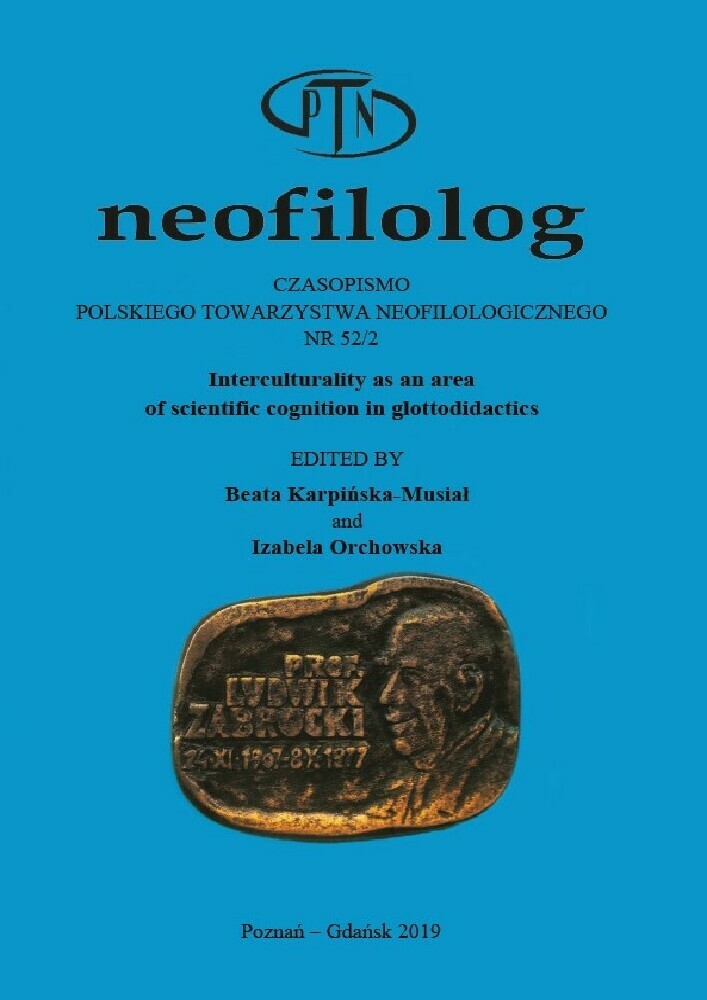Résumé
The following article has two goals. The first is the presentation of theo-retical approaches to the translation of culture-specific content and expla-nation of some relevant terms, which include culture, interculturality, in-tercultural competence and translational cultural competence. The sec-ond is to discuss practical teaching problems and possible solutions that translational didactics must keep in mind in its research perspective. The practical considerations relate to the transfer of written texts and to the education of students who gain their first experiences in translational activity. With questions about the text, which trigger its analysis on the macro- and microstructural level, the students should be motivated to approach cul-tural content reflexively and to reflect it in the target language.Références
Altmayer C. (2014), Kulturwissenschaft – eine neue Perspektive für die inter-nationale Germanistik? (w) „Vernum et Lingua“ Nr. 3/2014, str. 58-77.
Bolten J. (2007), Interkulturelle Kompetenz. Erfurt: Sömmerda.
Bührig K., Meyer B. (2015), La pratique multilingue, les régimes linguistiques et la culture traductionnelle dans des hôpitaux allemands, (w) „Langage et société“ nr 153, str. 75-90.
Chłopek Z. (2014), Przekład jako problem dydaktyczny z perspektywy psycholingwistycznej (w) „Języki Obce w szkole” 4/2014, str. 77-84.
Dolata-Zaród A. (2009), Aspekty kulturowe w tłumaczeniu tekstów specjalistycznych (w) „Rocznik Przekładoznawczy” 5, str. 83-91.
Filipiak M. (1996), Socjologia kultury. Zarys zagadnień, Lublin: Wydawnictwo UMCS.
Gerzymisch-Arbogast H. (1994), Übersetzungswissenschaftliches Propädeuti-kum. Tübingen-Basel: Francke.
Grucza F. (1983), Zagadnienia metalingwistyki. Lingwistyka – jej przedmiot, lingwistyka stosowana. Warszawa: PWN.
Grucza S. (2010), Główne tezy antropocentrycznej teorii języków (w) „Lingwistyka Stosowana/Applied Linguistics/Angewandte Linguistik” 2, str. 41-68.
Göhring H. (1998), Interkulturelle Kommunikation (w) Snell-Hornby M., Hönig H.G., Kußmaul P., Schmitt P.A. (Hrsg.), Handbuch Translation. Tübingen: Stauffenburg, str. 112-115.
Haviland W. A., Prins Harald E.L., Walrath D. (2005), Cultural Anthropology. The Human Challenge. Belmont: Wadsworth.
Hejwowski K. (2004), Kognitywno-komunikacyjna teoria przekładu, Warszawa: PWN.
Hinc J. (2016), Übersetzungstechniken in der Übersetzung von kulturspezifischen Inhalten – aus der Sicht der Translationsdidaktik (w) Mihułka K., Bąk P., Chojnacka-Gärtner J. (Hrsg.), Interkulturalität in Theorie und Pra-xis der Glottodidaktik und Translatorik. Rzeszów: Wydawnictwo Uni-wersytetu Rzeszowskiego, str. 105-115.
Kizik E. (2001), Wesele, kilka chrztów i pogrzebów. Uroczystości rodzinne w mieście hanzeatyckim od XVI do XVIII wieku, Gdańsk: Officyna Ferberiana.
Małgorzewicz A. (2012), Die Kompetenzen des Translators aus kognitiver und translationsdidaktischer Sicht. Wrocław: Wydawnictwo Uniwersytetu Wrocławskiego.
Małgorzewicz Anna (2014), Językowe i niejęzykowe kompetencje tłumacza. Próba zdefiniowania celów translodydaktyki akademickiej (w) „Lingwistyka Sto-sowana/Applied Linguistics/Angewandte Linguistik” 11, str. 1-10.
Meyer S., Sprenger G. (2011), Der Blick der Kultur- und Sozialanthropologie Sehen als Körpertechnik zwischen Wahrnehmung und Deutung. (w) Meyer S., Owzar A. (Hrsg.), Disziplinen der Anthropologie. Münster: Waxmann, str. 203-227.
Mocarz M. (2003), Interkulturowość w przekładzie tekstów użytkowych (na materiale rosyjskich i niemieckich tłumaczeń przewodników po Polsce) (w) „Rocznik Przekładoznawczy” 2007/8, str. 161-169.
Mocarz-Kleindienst M. (2014), Kompetencja interkulturowa w dydaktyce prze-kładu (w) „Roczniki Humanistyczne” LXXII, str. 127-137.
Müller-Jacquier B. (1999), Interkulturelle Kommunikation und Fremdsprachen-didaktik. Koblenz: Universität Koblenz-Landau.
Neuland E. (2013), Interkulturalität – immer noch eine Herausforderung für Linguistik und Deutsch als Fremdsprache (w) „Zeitschrift des Verbandes Polnischer Germanisten“ 2, str. 161-177.
Sieradzka M. (2016), Übersetzen als interkultureller Transfer (w) Mihułka K., Bąk P., Chojnacka-Gärtner J. (Hrsg.), Interkulturalität in Theorie und Pra-xis der Glottodidaktik und Translatorik. Rzeszów: Wydawnictwo Uni-wersytetu Rzeszowskiego, str. 89-104.
Tomaszkiewicz T. (2006), Przekład audiowizualny, Warszawa: PWN.
Widła H. (2016), Znajomość języków obcych a znajomość kultur (w) „Języki Obce w Szkole”, 1/2019, str. 86-91.
Wierlacher A. (2003), Interkulturalität (w) Wierlacher A., Bogner A. (Hrsg.), Handbuch interkulturelle Germanistik. Stuttgart: Weimer , str. 257-263.
Witte H. (1998), Die Rolle der Kulturkompetenz (w) Snell-Hornby M., Hönig H.G., Kußmaul P., Schmitt P. A. (Hrsg.), Handbuch Translation. Tübingen: Stauffenburg, str. 345-348.
Żmudzki J. (2013), Holizm funkcjonalny w perspektywie translatoryki antropo-centrycznej (w) „Lingwistyka Stosowana/Applied Linguistics/Ange-wandte Linguistik” 8, str. 177-187.
Żmudzki J. (2003), Transferprozesse und -typen beim Vollzug des Konsekutiv-dolmetschens (w) Antos G./Wichter S. (Hrsg.), Transferwissenschaft. Wissenstransfer durch Sprache als gesellschaftliches Problem. Berlin, New York, Wien, Zürich: Peter Lang, str. 251-264.
Żygulski K. (1972), Wstęp do zagadnień kultury, Warszawa: P.A.X.
https://www.duden.de/rechtschreibung/poltern [DW 7.05.2019]
https://www.hochzeitsplaza.de/mustertexte/hochzeitsanzeigen [23.04.2019]
Licence
© Neofilolog 2019

Ce travail est disponible sous licence Creative Commons Attribution - Pas de Modification 4.0 International.
Auteurs :
Les auteurs de textes acceptés pour publication dans la revue Neofilolog sont tenus de remplir, signer et renvoyer à l'adresse de la rédaction, un accord sur l'octroi d'une licence gratuite pour les œuvres, avec obligation d'accorder une sous-licence CC.
En vertu de cet accord, les auteurs des textes publiés dans la revue Neofilolog accordent à l'Université Adam Mickiewicz de Poznań une licence non exclusive et gratuite et permettent l'utilisation de la sous-licence Creative Commons Attribution-NoDerivatives 4.0 International (CC BY-ND 4.0).
Les auteurs se réservent le droit de disposer librement de l'œuvre.
Utilisateurs :
Les utilisateurs d'Internet intéressés ont le droit d'utiliser les œuvres publiées à partir de l'année 2017 sous réserve des conditions suivantes :
- reconnaissance de la qualité d'auteur - l'obligation de fournir des informations sur la qualité d'auteur, le titre, la source (liens vers l'œuvre originale, DOI) et la licence, ainsi que l'œuvre distribuée ;
- sans créer d'œuvres dérivées - l'œuvre doit être conservée dans sa forme originale, p. ex. les traductions ou les interprétations ne peuvent être distribuées sans le consentement de l'auteur.
Tous les textes publiés sont soumis au droit d'auteur.
Autres :
L'Université Adam Mickiewicz de Poznań se réserve le droit à la revue dans son ensemble (mise en page, forme graphique, titre, conception de la couverture, logo, etc.).
.

